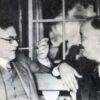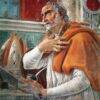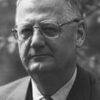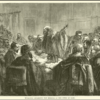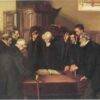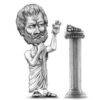Tag: classical
The Triune Worshippers against the Eunomians and Classical Liberals
Being a human coram Deo (before or in the presence of the living God), in regard to its telos or purposefulness, is underwritten by being a worshipper of the triune God rather than an as an idolater of a self-projected god of a unitarian and individualistic origination. So-called classical liberalism, much of which was in fact Teutonic or German in orientation, of the Enlightenment/ -post higher critical ilk, is of the latter instance. That is to say, higher critics of the New Testament so demythologized the NT of its reality in the Theandric person of Jesus Christ, that all that…
Pierre Maury Contra the ‘Horrible Decree’ of Predestination in the classical Calvinists
Pierre Maury was Karl Barth’s ‘French connection’ and friend. Without Maury’s thinking and writing on a reformulated Reformed doctrine of predestination, Barth’s turn, and own treatment of predestination (as exemplified in his Church Dogmatics II/2) may never have happened; at least not in the shape that it did. Here is Maury on a critique of the classical Augustinian inspired doctrine of election/reprobation (especially as that developed within what came to be called Post Reformed orthodox Dogmatics in the 16th and 17th centuries, respectively): Before we proceed further, there is an important point which must be made clear. If what we…
The Work of Christ is the Person of Christ: Against Dualistic Classical Theology
When the work of Christ is separated from the person of Christ, all you can be left with are either pure Pelagian or semi-Pelagian doctrines of salvation; as that becomes funded by some functional type of an adoptionistic christology (e.g., Ebionism etc.) This is why TFT refers to the Latin Heresy: he is referring to theologies, Western-Augustinian ones, that ultimately don’t think salvation, as both objectified and subjectivized in the Monarxia of God in the person of Jesus Christ. When this or that individual person is understood as being “elect” of God, based on an arbitrary and hidden decree of…
The Lion-Lamb God versus the God of Classical Theism and orthodoxies
I think part of the problem is that there is a lot of theological insecurity out there, so there is a desire to find stability and safe-haven in a bulwark of theological enterprise that has time and development behind it. The problem with that approach, though, is that time isn’t God. A major aspect of the incarnation of God in Christ is the Revelation that God’s stability is filial and vulnerable. There is a sense of vulnerability and nakedness before God that characterizes God’s relationship with us, and thus ours with Him. Attempting to find repose in the God who…
The Seed of the Classical Theistic God Given Blossom in the god of Modern Atheism
I have been an oft critic of the ‘classical theistic’ god. The classical theistic God is typically known by actus purus, ‘pure being.’ I have argued that this conception of Godness as Monad comes to us from the ancient Greek philosophers, and not from God’s Self-revelation of Himself in Jesus Christ. Some would say that my argument is modern, but that would simply be the chronological snobbery fallacy. Truth has no provenance; that is, truth is truth no matter where or whence it comes. Bruce McCormack describes this sort of critique this way (here his comments are in the context of his treatment on Eberhard Jüngel’s explication…
More on classical Calvinism and Arminianism?
Out of curiosity: is anyone interested in more posts on classical Calvinism and Arminianism, and how they contrast with Evangelical Calvinism and/or Athanasian Reformed theology? I haven’t written those types of posts very much lately; I’m not even promising I will. But just curious if there is any interest in that, since that used to be the mainstay of what I engaged with. Athanasian Reformed
Against the God of classical Calvinism and Arminianism From the For-ness of God for the World in Christ
The God of classical Calvinism and Arminianism is the same God, in the sense that their respective doctrines of God find resource in what Richard Muller identifies as ‘Christian Aristotelianism.’ How the Christian thinks of God will determine all else following, theologically. Since the actus purus (‘pure being’) god of Aristotle stands structurally and materially behind the way that Calvinism and Arminianism generally conceive of a God-world relation, what happens is that they must construct a system wherein this God remains untouched by said creation/world. In this effort, said systems have come to think of this God-world relation through a…
Introducing the Real classical Calvinism: ‘If you’re going to debate it, at least know what you’re debating about’
As usual, in the right online environs, the Calvinist-Arminian (Provisionist) debate has carried on unabated by not actually engaging with the actual entailments of a real-life Calvinist-Arminian theology. In other words, what the reader will find, are people who are in this interminable joust, oriented by the five points of Calvinism, or not. There is a free-flow exchange between favorite prooftexts, and their ostensible exegesis, and/or an intractable debate about this or that philosophical understanding vis-à-vis God’s sovereignty and human agency in freewill. I am almost positive that everyone reading here is well aware of what I am referring to….
classical Calvinists (and Arminians) Don’t Actually Affirm Total Depravity
I just wrote the following, off the top, as a long Tweet; take it for what it’s worth. It’s ironic when you think about it: classical Calvinists claim to be strident proponents of a doctrine of total depravity. But when you actually look at the historical ideational development there, what you get from them is a Thomist intellectualist anthropology. This entails that the intellect is the defining component of what defines a human being as a human being in a faculty psychology. The classical Calvinist (and Arminian), following Aquinas and Aristotle, requires that at the time of the fall the…
The Monad’s Banqueting Table: On Classical Theism’s Affectionless God
Classical theism is once again a hot-topic. If you scroll through theo-Twitter you will find an in-house debate on the entailments of a classical theism. But this isn’t just reducible to the debate between the Reformed Baptists, and the impact that Thomas Aquinas has had upon the development of their respective types of Reformed and/or Calvinist theology. This debate is ongoing amongst philosophical theologians like Ryan Mullins, Steven Nemes et al., and whatever their alternative offering might be—whether that be an ‘open theistic’ understanding, or something more phenomenal. And then of course we have the charge against folks like Barth,…
